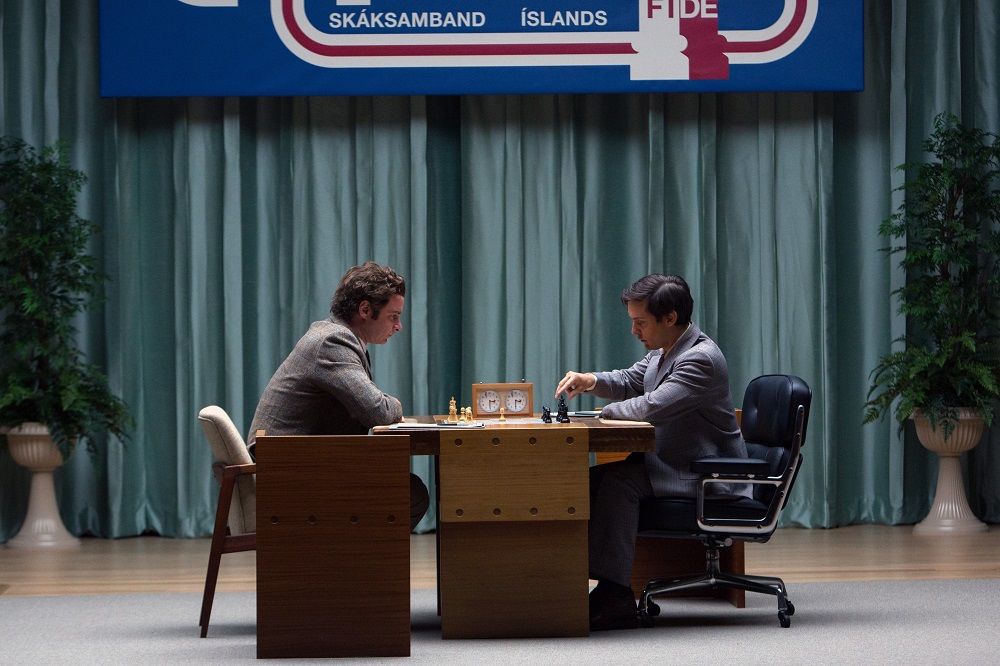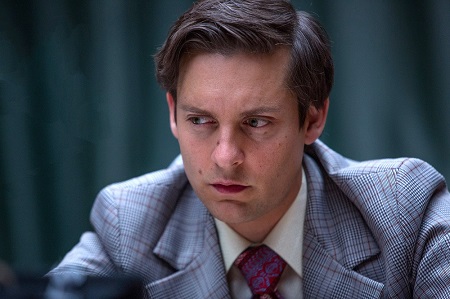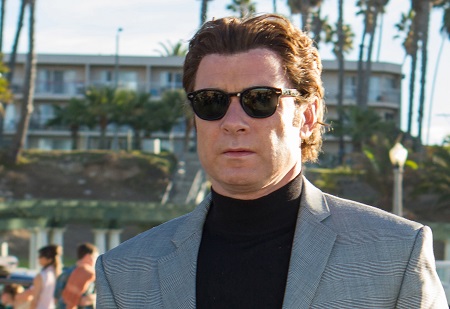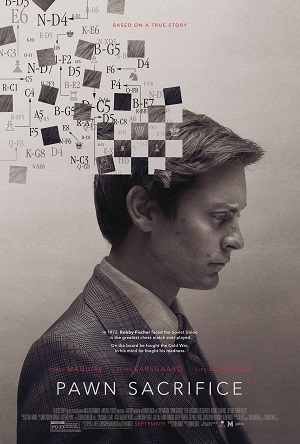
Moving Pawn Sacrifice a Dramatic Grandmaster
At the height of the Cold War, Brooklyn-born Bobby Fischer (Tobey Maguire) finds himself sitting in a secluded house on the outskirts of Reykjavík, Iceland preparing to confront the number one chess player in the world in an epic 21-game match, Russian grandmaster and international superstar Boris Spassky (Liev Schreiber). It’s East vs. West on an unimaginably intimate scale, both American and Soviet governments going out of their way to color the match in a way that allows their country to come off as superior.
What no one could count on, what none involved could anticipate, is just how frazzled and fractured Fischer’s mental state would be. Always a bit of a narcissistic mess, prone to saying and doing a variety of self-destructive things that many see as attempts to sabotage his own genius, by all accounts this 1972 contest was what he’d been training and preparing his entire life for, so to see him suddenly make impossible demands at the very last second catches almost everyone involved entirely off guard.
Director Edward Zwick (Glory, The Last Samurai) and screenwriter Steven Knight (Locke, Dirty Pretty Things) join forces to take a brief glimpse at Fischer’s life with Pawn Sacrifice, attempting to flesh out this enigmatic genius as completely as they can. Culminating with the 1972 chess championship, focusing particularly on the game six match many aficionados consider the best ever played, this is a not-so-subtle reminder about how genius and madness oftentimes go hand-in-hand, and as such is an absorbing drama of psychological deterioration impossible to dismiss.
Anchoring things is Maguire, the film an invigorating reminder just how terrific an actor the former Spider-Man and Pleasantville star has consistently been, even if he is not always recognized as one. It’s possible he’s never been better, inhabiting Fischer completely, bringing to life his mental illness with a stirring virtuosity I found mesmerizing. I got a real feel for just how schizophrenic his mind was working, Maguire flipping from anger, to bliss, to wonder, to driven determination at the drop of the hat. His interactions with his friends, family and opponents are always walking along a razor’s edge, it always a question as to what he is going to do or say, the actor making these sudden shifts in focus and personality breathlessly genuine.
Maguire finds the humanity lurking inside of Fischer, allowing me to get something of a closer appreciation and understanding of the man than any I ever could have anticipated knowing. Even though he’s playing a game most of us only have the basest of understanding of, even though his mind is racing a million times faster than the majority of those he comes into contact with, Maguire allows Fischer the person to come to the forefront, not the wildly divergent interpretations of him that have been spoken about in a variety of hushed tones ever since his disappearance off the world stage during the 1970s. It’s a towering, monumental performance, and I guarantee it is one I’ll be thinking about and contemplating for the remainder of the year.
Schreiber is nearly as tremendous even if he has far less to do. His reactions to all that’s transpiring during their pivotal game six match are astonishing, and it’s hard not to want to rise to one’s feet and applaud alongside everyone else when the moment depicted up on the screen suddenly calls for it. The veteran character actor also drops numerous hints at the toll being a chess grandmaster can cost; and while the Russian holds things together as best he can, it’s also fairly obvious it wouldn’t take too much for him to fall into the similar state of mental disrepair as his American opponent.
The middle section of the film works the best, Zwick and Knight doing a fine job of putting the pieces in place that will allow the Reykjavík match to finally come to fruition. They also get some fine, winning supporting performances out of Peter Sarsgaard (as fellow U.S. chess champ and Fischer friend Father Bill Lombardy) and Michael Stuhlbarg (as Fischer’s increasing frazzled personal manager Paul Marshall), each making the most of the screen time granted them.
Where the film stumbles is in the depiction of Fischer’s home and family life, using his genius as a child as nothing more than a montage starting point, and not even a very good one at that. Lily Rabe is more or less wasted as his loving older sister Joan, the few glimpses we end up getting of her far too heavy-handed and melodramatic for my taste. This is particularly annoying considering just how observationally subtle the remainder of the motion picture is, these sequences and scenes calling attention to themselves sadly for all the wrong reasons.
None of which thankfully derails Pawn Sacrifice as a whole. Featuring an inspired score by the great James Newton Howard (Nightcrawler), expertly lensed by Bradford Young (Selma) and showcasing superlative production design work courtesy of rising star Isabelle Guay (300), the look and feel of the motion picture comes close to perfection. Zwick directs with a steady hand, allowing the performances of Maguire and Schreiber to do the majority of the heavy lifting. With the board constantly in motion, the film consistently kept me on my toes, the entertainment victory it ultimately scored almost as surprising and as unanticipated as any I could have competed for myself.
Film Rating: 3 (out of 4)








